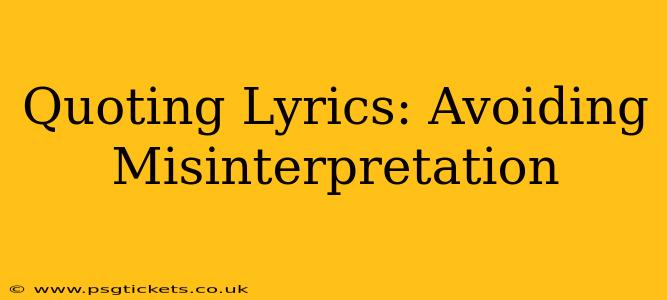Quoting song lyrics can be a powerful way to add emphasis, evoke emotion, or illustrate a point. However, the nuances of language, the context of a song, and the potential for misinterpretation make accurate and responsible quoting crucial. This guide will explore the key considerations for quoting lyrics effectively and avoiding common pitfalls.
Why Accurate Lyric Quoting Matters
Incorrectly quoting lyrics can lead to several problems:
- Misrepresentation of the artist's intent: Altering even a single word can change the meaning of a lyric entirely, potentially misrepresenting the artist's message or artistic vision.
- Erosion of credibility: Getting lyrics wrong undermines your credibility as a writer or speaker. It suggests a lack of attention to detail and potentially a lack of understanding of the subject matter.
- Legal issues: In some cases, unauthorized alteration or misattribution of copyrighted material can have legal ramifications.
How to Quote Lyrics Correctly
Here's a step-by-step guide to ensure accurate and responsible lyric quoting:
-
Find a Reliable Source: Don't rely on memory alone. Use reputable lyric websites like AZLyrics, Genius, or official artist websites. Compare multiple sources if possible to ensure accuracy.
-
Use Quotation Marks: Always enclose lyrics within quotation marks (" ") to clearly indicate that you are quoting someone else's work.
-
Cite Your Source: Provide a citation indicating the song title, artist, and album (if applicable). For example: ("Bohemian Rhapsody," Queen, A Night at the Opera). This gives credit to the artist and allows readers to easily verify your quote.
-
Contextualize Your Quote: Don't just drop a lyric into your writing. Provide sufficient context to explain why you're using the quote and how it relates to your overall point.
-
Handle Ellipses Carefully: If you're omitting parts of a lyric, use ellipses (...) to indicate the omission. However, avoid using ellipses in a way that distorts the meaning of the original lyrics.
-
Use Brackets for Clarification (Sparingly): If necessary, you can use brackets [ ] to add a brief clarification or explanation within a quote, but only if it's absolutely essential and doesn't alter the original meaning.
-
Consider the Song's Genre and Style: The meaning of lyrics can be greatly influenced by the genre and style of the music. Be mindful of this context when interpreting and quoting lyrics.
Common Mistakes to Avoid
- Misremembering Lyrics: Always double-check your quotes against a reliable source.
- Altering Lyrics: Even minor changes can dramatically alter the meaning. Quote precisely as written.
- Poor Contextualization: Explain the relevance of the quote to your argument. Don't just throw it in randomly.
- Ignoring Copyright: Be mindful of copyright laws and obtain permission if necessary for commercial use.
Frequently Asked Questions
What if I can't find the lyrics online?
If you can't find the lyrics through reputable sources, consider whether the quote is essential. It's better to paraphrase or omit the quote entirely than to risk inaccuracy.
How do I handle slang or dialect within lyrics?
Explain any slang or dialect in a footnote or parenthetical comment to ensure clarity for your readers.
Can I use just a portion of a lyric?
Yes, you can, but ensure that the portion you quote accurately reflects the overall meaning and doesn't create a misleading impression. Use ellipses appropriately.
What if different sources have slightly different lyrics?
Compare several sources. If there are persistent discrepancies, note the variations and choose the version that seems most accurate and widely accepted.
By following these guidelines, you can ensure that your use of song lyrics is accurate, responsible, and enhances rather than detracts from your writing. Accurate quoting shows respect for the artist and builds trust with your audience.

